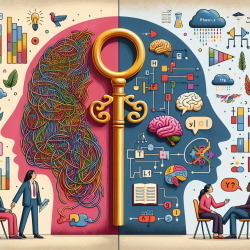Introduction
Autism Spectrum Disorder (ASD) presents unique challenges in the realm of special education and therapy. As practitioners, we are constantly seeking innovative approaches to enhance the lives of those affected by ASD. A recent study titled "Outcomes of bone marrow mononuclear cell transplantation combined with interventional education for autism spectrum disorder" offers promising insights that could potentially reshape therapeutic strategies.
The Study in Focus
The study conducted by Nguyen Thanh et al. evaluated the safety and efficacy of combining autologous bone marrow mononuclear cell (BMMNC) transplantation with educational interventions for children with ASD. This open-label clinical trial involved 30 children who met the autism criteria of the DSM-5 and had high Childhood Autism Rating Scale (CARS) scores.
The procedure involved harvesting bone marrow, isolating mononuclear cells, and infusing them intrathecally. Following this, participants underwent an 8-week educational intervention based on the Early Start Denver Model. The results were compelling, showing a significant reduction in ASD severity and improvements in adaptive behavior, social communication, language, and daily skills.
Implications for Practitioners
For practitioners in the field of special education and therapy, these findings open up new avenues for enhancing intervention strategies. Here are some ways practitioners can leverage these insights:
- Integrate Multidisciplinary Approaches: Consider incorporating medical and educational interventions to address the multifaceted nature of ASD.
- Stay Informed: Keep abreast of the latest research in stem cell therapy and its potential applications in ASD.
- Collaborate with Medical Professionals: Establish partnerships with healthcare providers to explore the feasibility of incorporating BMMNC transplantation in treatment plans.
- Customize Educational Interventions: Tailor educational strategies to complement medical treatments, enhancing overall outcomes for children with ASD.
Encouraging Further Research
While the study provides promising results, further research is necessary to fully understand the long-term implications and potential of BMMNC transplantation in ASD treatment. Practitioners are encouraged to engage in or support ongoing research efforts to refine these therapeutic approaches.
Conclusion
The integration of bone marrow mononuclear cell transplantation with educational interventions represents a novel and promising approach in the treatment of autism spectrum disorder. As practitioners, embracing such innovative strategies could significantly enhance the quality of life for individuals with ASD.
To read the original research paper, please follow this link: Outcomes of bone marrow mononuclear cell transplantation combined with interventional education for autism spectrum disorder.










